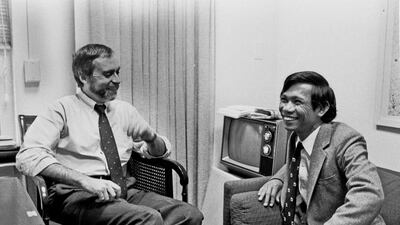NEW YORK // Sydney Schanberg, a former correspondent whose Pulitzer Prize-winning coverage of the fall of Cambodia to the Khmer Rouge inspired the movie The Killing Fields, has died.
He was 82.
Schanberg, who worked for the New York Times and Newsday, gained international prominence for his reporting on the atrocities accompanying the communist takeover of Cambodia.
He suffered a heart attack earlier in the week and died on Saturday at Vassar Brothers Medical Center in Poughkeepsie, New York, his wife Jane Freiman told Newsday.
His work helped to bring worldwide attention to the brutal genocide in Cambodia during the 1970s.
"Sydney Schanberg was an historic and courageous correspondent," said Dean Baquet, executive editor of The Times. The newspaper described Schanberg as "a nearly ideal foreign correspondent: a risk-taking adventurer who distrusted officials, relied on himself in a war zone and wrote vividly of political and military tyrants and the suffering and death of their victims with the passion of an witness to history".
He was part of a generation of war correspondents who made America understand what was truly happening in Vietnam and Cambodia, said Mr Baquet.
When Communist guerrillas overran the Cambodian capital of Phnom Penh in the spring of 1975, the newspaper said, Schanberg and his Cambodian assistant Dith Pran refused pleas by their editors to evacuate.
They were briefly captured by the guerrillas, and later fled to the French embassy.
But Dith was eventually expelled from the compound and forced to join an exodus of Cambodians into the countryside as part of the Khmer Rouge’s radical, murderous social experiment: turning Cambodia into a modern-day agrarian society.
People suspected of coming from educated, prosperous backgrounds were targeted mercilessly. An estimated two million people died in the genocide – from outright murder, starvation in labour camps or disease.
After two weeks at the embassy, Schanberg and other foreigners were trucked to Thailand. There, he filed his first report on the fall of Phnom Penh and the hellish early days of life under the Khmer Rouge and its emptying of the capital city.
Schanberg returned to New York, and while taking off time from his work at the newspaper, helped Dith’s wife and children resettle in San Francisco.
Schanberg won awards including the Pulitzer, which he said he shared with Dith. He also set about the gargantuan task of finding Dith, whose whereabouts remained unknown for years.
In 1978, Vietnam invaded Cambodia and toppled the Khmer Rouge. Dith escaped to Thailand in 1979 and was eventually reunited with Schanberg.
Schanberg helped him get a job at The Times and move his family to New York.
An article that Schanberg published in 1980 in the New York Times Magazine — entitled "The Death and Life of Dith Pran" — was turned into a book and inspired The Killing Fields.
Dith died in 2008.
“I’m a very lucky man to have had [Dith] Pran as my reporting partner and even luckier that we came to call each other brother,” Schanberg said after Dith’s death. “His mission with me in Cambodia was to tell the world what suffering his people were going through in a war that was never necessary. It became my mission too. My reporting could not have been done without him.”
Schanberg joined The Times in 1959 as a copy boy and remained there for 26 years. He later wrote a column for New York Newsday.
Besides the Pulitzer, he won two George Polk Memorial awards, two Overseas Press Club awards and Sigma Delta Chi’s distinguished journalism prize.
* Associated Press, Agence France-Presse and Reuters

